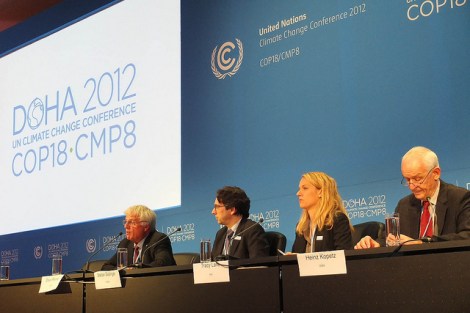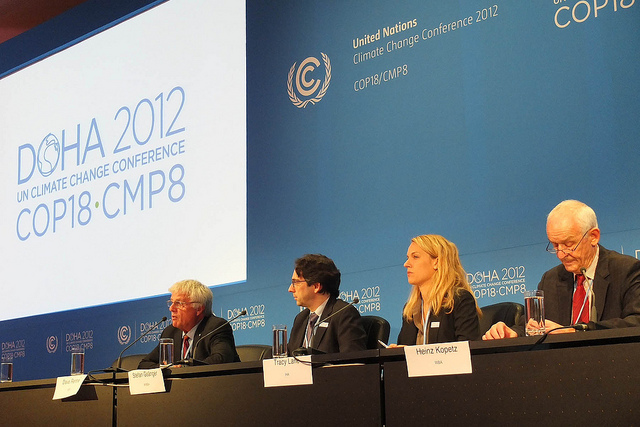There are pretty good odds that the atmosphere already contains enough greenhouse gases to push global temperatures more than 2 degrees C higher by the end of the century, an increase broadly understood to mean catastrophic effects across the globe. If the atmosphere isn’t yet at that point, the amount that we’d have to curb our pollution to prevent it becomes steeper and less realistic by the day.
Which is why the United Nations — having previously eradicated from the world the scourges of war, poverty, inadequate medical care, and hunger — holds annual meetings during which it consistently and efficiently ratchets down the levels of greenhouse gas emissions from all of the nations of the world. Every schoolkid, no matter his or her nation of origin, has a photo of Secretary-General Ban Ki-moon over the bed, dreaming of one day attaining that most-powerful position on Earth.
This year’s annual meeting, held in Doha, Qatar, wrapped up over the weekend. Two weeks ago, we offered a fairly cynical preview of what to expect from the United Nations’ gathering. Our prediction for its ineffectiveness was almost too optimistic.
As in previous years, participants (limited to a fairly small group of people with credentials given by the U.N.) spent 13 days, 23 hours, and 59 minutes of the two weeks arguing loosely about funding issues and then spent a furious 60 seconds developing a face-saving and ineffective agreement that will, at the very least, ensure that they will be able to expense plane tickets to next year’s meeting. (If this is an exaggeration, it is a slight one.) The last-minute agreement, as described by Reuters:
Almost 200 nations extended on Saturday a weakened U.N. plan for fighting global warming until 2020, averting a new setback to two decades of U.N. efforts that have failed to halt rising world greenhouse gas emissions.
The eight-year extension of the Kyoto Protocol beyond 2012 keeps it alive as the sole legally binding plan for combating global warming. But it was sapped by the withdrawal of Russia, Japan and Canada, so its signatories now account for only 15 percent of global greenhouse emisions. …
A package of decisions, known as the Doha Climate Gateway, would also postpone until 2013 a dispute over demands from developing nations for more cash to help them cope with global warming.
All sides say the Doha decisions fell far short of recommendations by scientists for tougher action to try to avert more heatwaves, sandstorms, floods, droughts and rising sea levels.
In summary: The main victory from the meeting was that the Kyoto Protocol (remember the Kyoto Protocol?) will limp forward, with fewer signatories. Yaaayyyyy. But then, as Mother Jones put it: “it’s something.” It seemed for much of the process that even a tiny victory would slip through participants’ fingers; that Kyoto was plucked from the recycling bin is better than nothing and not much else. And as for providing economic support to developing nations that want to build in systems for fighting carbon pollution? We’ll talk to you next year in London.

hydropowerNeither this press conference nor the elegant COP18 branding could stem rampant carbon pollution :(
A columnist at The Guardian suggests that there may be one other cause for optimism.
Doha reaffirms that [a replacement to Kyoto] must aim to achieve the UN goal of limiting global warming to 2C. [Ed. – You know, if possible.] And it sets in train a process to review countries’ emissions targets, with the aim of closing the “emissions gap” between current pledges and the reductions needed to meet that goal. The deal creates a new mechanism to compensate the countries worst hit by climate change for the loss and damage it causes. A single negotiations platform has been established to achieve the new agreement, with a deadline for completion of 2015.
This is a much bigger deal than most commentators, and most governments, have realised.
But!
The last time there was a negotiating deadline was 2009, in Copenhagen.
That turned out poorly.



